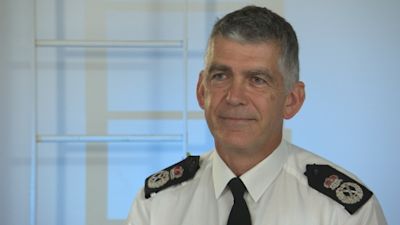Bodycams, protests and a pandemic: Avon and Somerset police chief reflects as he steps down

Watch Chief Constable Andy Marsh's full interview with ITV presenter Jonty Messer
At the start of July, Andy Marsh will find himself with something he has not had a lot of for a number of years - free time.
He started his policing career at Avon and Somerset in 1987. He went on to serve as Chief Constable for Hampshire Constabulary before taking on the same role at Avon and Somerset in 2016.
His job has dominated his life, although the Chief Constable says it is not a job - it is 'the job', a vocation, a passion - and you get the sense he would not have it any other way.
In fact during his time leading the Avon and Somerset force, Mr Marsh is entitled to 35 days annual leave but during his time with the force he has not once taken his full entitlement.
And yet there is no doubt the past 12 months have been among the most challenging of his policing career.
He has had to contend with a global pandemic which placed new demands on policing and a Black Lives Matter demonstration which put his force's policing in the international spotlight when the statue of Edward Colston was toppled.
Nine months after the statue was torn down, a protest once again saw Bristol police make headlines around the world when a Kill The Bill demonstration turned violent, ending in a riot which left dozens of police officers injured.
As he prepares to leave his role as Chief Constable of Avon and Somerset Police, Mr Marsh spoke to ITV News about his career, the challenges of policing during the past 12 months and why now was the right time to leave the role.
Police respond after journalist ‘assaulted’ at Bristol protest
Bristol police boss defends force’s response to a Kill The Bill protest on College Green
Andy revealed he had recently been on patrol with two female officers in Yeovil who had both been at the riots outside Bridewell Police Station in March.
"One of them had a container of urine thrown over her and was assaulted," he said.
"Another one had her helmet smashed by a bottle thrown. Now to smash a public order helmet takes an awful lot. She was pushed under a police horse, incredibly traumatised - and these are real people."
But he was keen to stress the events of the past year are not the reason he is leaving the role, praising how the force has adapted and coped.
He said: "I feel I've seen the worst of this pandemic through and I'm incredibly proud of how police officers that I'm privileged to serve with, and police staff, have managed the Black Lives Matter protest, the Kill The Bill protest and the policing of Covid."
So why was now the right time to leave?
One of the main reasons he gave was the length of contract a Chief Constable can be offered.
Currently a first contract can be up to five years with a subsequent renewal of up to three years, both of which Mr Marsh has served. After that however, the contract is renewed annually, something he feels does not tally with the scale of the job.
"I don't think an annual renewal of a contract is a good position for a job as significant as leading a really brilliant organisation like Avon and Somerset Constabulary," he said.
Others have questioned the timing coinciding with the election of a new Police and Crime Commissioner (PCC), with Conservative Mark Shelford replacing Independent Sue Mountstevens.
Mr Marsh said he has had "fantastic" relationships with politicians from all three of the UK's main parties.
"He [Mr Shelford] will bring his own skills and views and approach to it and from everything I've seen he wants the people who live in Avon and Somerset, and Avon and Somerset Constabulary, to be successful."
One of the first big jobs facing Mark Shelford is replacing Mr Marsh, who outlined the qualities needed for the role.
"They need to have really good experience of a broad range of policing both rural and urban and of different specialities. They need to be values driven and they need to be public service-minded in their outlook and, of course, an outstanding leader and communicator."
When asked about highlights during his career, Mr Marsh was quick to praise the work of colleagues and pay tribute to those who work in policing.
But from a personal view, he is clearly proud of his role in the introduction of body-worn cameras to officers, which is now part of the British policing landscape. Mr Marsh has gone on to advise the US, Canada, France and Portugal on their use.
So what now? Well Mr Marsh does still expect to work, although what that work will involve is not yet clear and there will be plenty more time for his other passions, family, football and fishing.
Read more: